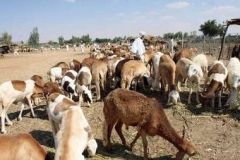Sudanese celebrate Eid in turmoil over slaughter
December 19, 2007 (KHARTOUM) — Sudanese celebrated the Muslim sacrificial holiday of Eid al-Adha on Wednesday but many were cautious about slaughtering animals after an outbreak of the Rift Valley Fever virus.
 The Health Ministry said that as of December 16 there were 565 cases of haemorrhagic fever reported in humans.
The Health Ministry said that as of December 16 there were 565 cases of haemorrhagic fever reported in humans.
“The fatality rate is 29 percent (with) haemorrhagic fever. (And) we have about 5 or 6 cases of eye manifestation,” said spokesman Magdi Saleh.
But the government denied there were any confirmed cases in cattle, a main source of income for many Sudanese in the agricultural economy, or in sheep.
Rumours of the virus caused panic among Sudanese Muslims as they celebrated Eid al-Adha which began on Wednesday with the slaughtering of sheep to remember Abraham who was prepared to sacrifice his son for God.
“I am still not sure whether to slaughter or not,” said trader Mohamed Omer. He said he did not trust the government’s directive to go ahead and slaughter sheep for the holiday.
Rumours of dead animals in Khartoum with blood streaming from their mouths are rife. Some of the poor who go to people’s houses during the holiday to get food refused to take raw meat this year. The price of powdered milk rose in the market as people became too scared to drink fresh milk.
The ministry of animal resources said a batch of samples of animal blood from an isolated area in While Nile state came back 25 percent positive for antibodies of the virus.
“(But) the positive results were as a result of antibodies maybe due to vaccinations or due to past infection,” spokesman Abdel Moneim said.
He said the samples sent to a South African laboratory were being tested again to see if the antibodies had increased with time, which would confirm an outbreak of the disease.
Mohamed Abdel Ghazi, a senior official from the ministry, said they were still waiting for the results.
BLEEDING
Rift Valley Fever, named after the part of Africa in which it is prevalent, is an animal disease which can spread to humans through mosquitoes or through contact with bodily fluid.
There is no commercially available vaccine for humans. About 1 percent of human cases get haemorrhagic fever bleeding from the nose and mouth, which can result in a quick death. About 95 percent of human cases feel flu-like symptoms and then the virus disappears after a week.
Saleh said as of December 1 there were no new human cases from White Nile state where the animal tests are taking place. But cases had been recorded in three other states.
Vets in Khartoum criticised the government for not acting with transparency.
“The government should have been honest with the people and talked with transparency,” said one vet in Khartoum who declined to be named. “The people got panicked.”
The vet said the government should have issued guidelines on how to deal with meat and taken precautions such as spraying pesticides given the heavier than usual rains this year. Well-cooked meat and boiled milk is safe.
“We have a history of the disease since 1931 and some say even earlier … this was to be expected,” the vet said.
Sudan has in the past denied outbreaks of diseases. Earlier this year Kharotum denied an outbreak of cholera in the east announced by the World Health Organisation.
(Reuters)
